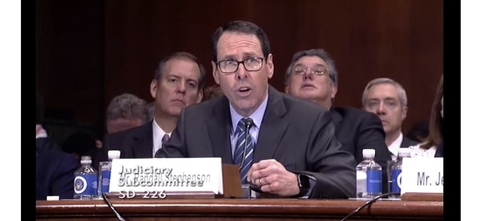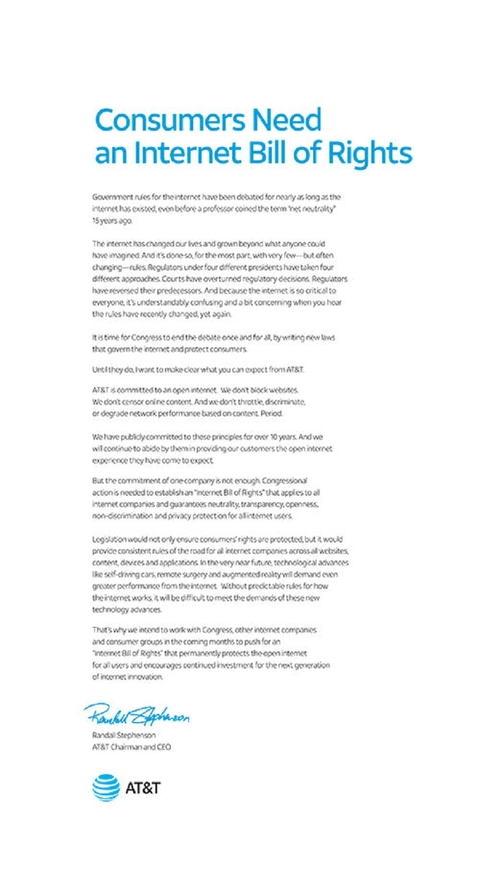AT&T’s pledge to Congress to create an “Internet Bill of Rights” for internet users following the FCC’s recent overturning of its 2015 net neutrality rules is drawing praise and derision from consumer and related telecom industry groups.
Randall Stephenson, CEO and chairman of AT&T, laid out his bill of rights idea in newspaper ads placed in The Wall Street Journal and other publications.
Stephenson said that while AT&T supports an open internet, there’s a need for Congress to provide a consistent set of rules that will benefit ISPs and consumers.
RELATED: FCC’s net neutrality revision challenged by 22 states

“Congressional action is needed to establish an 'Internet Bill of Rights' that applies to all internet companies and guarantees neutrality, transparency, openness, nondiscrimination and privacy protection for all internet users,” Stephenson said.
Stephenson added that by creating this bill of rights, Congress will not only allow users to continue to access the content and applications they want, but also give emerging companies the ability to drive new innovations.
“Legislation would not only ensure consumers’ rights are protected, but it would provide consistent rules of the road for all internet companies across all websites, content, devices and applications,” Stephenson said. “In the very near future, technological advances like self-driving cars, remote surgery and augmented reality will demand even greater performance from the internet. Without predictable rules for how the internet works, it will be difficult to meet the demands of these new technology advances.”

The telco says that it does not block websites, censor online content or throttle, discriminate or degrade network performance based on content.
Unsurprisingly, the response to Stephenson’s proposal was mixed.
On one hand, groups like the Internet Innovation Alliance that side with AT&T and other Tier 1 service providers on protesting using Title II as the basis for the 2015 net neutrality rules, agree that Congress needs to act on the net neutrality issue.
“We have long advocated for Congressional legislation that would make permanent the core principles of an open internet,” IIA said in a statement. “Only Congress can craft a unified regulatory framework that would apply to all entities in the internet ecosystem and provide the nation’s consumers and businesses with the online protections they deserve. Consumers should have one expectation of fair rules on the internet rather than a confusing patchwork depending on what sites they visit or how they access the internet.”
However, others like the Fight for the Future coalition does not agree with AT&T’s internet bill of rights idea.
"We had an internet bill of rights,” said Even Greer, campaign director of Fight for the Future. “It was called Title II and AT&T's army of lobbyists did everything in their power to burn it down.”
Greer called out AT&T for its large-scale lobbying to overturn the 2015 FCC net neutrality rules.
“It would be a lot easier to take AT&T at their word if they hadn't spent more than $16 million last year alone lobbying to kill net neutrality and privacy protections for internet users,” Greer said. “Internet activists have been warning for months that the big ISPs' plan has always been to gut the rules at the FCC and then use the 'crisis' they created to ram through bad legislation in the name of 'saving' net neutrality.”
Stephenson maintains that AT&T intends “to work with Congress, other internet companies and consumer groups in the coming months to push for an 'Internet Bill of Rights' that permanently protects the open internet for all users and encourages continued investment for the next generation of internet innovation.”